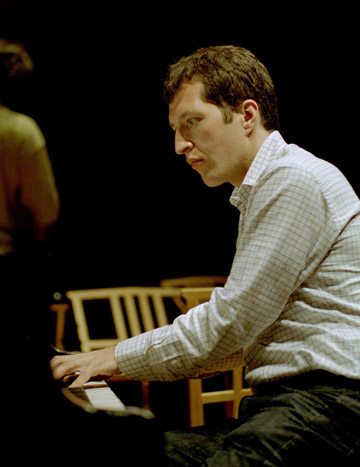
An intricate play of wit
Hurtling forward with barely a breath’s pause, the British composer and pianist Thomas Adès moved from Schubert’s Allegretto in C Minor, D. 915, with a crashing chord into his own Concert Paraphrase on Powder Her Face, Adès’ 1995 chamber opera. The opera about the scandalous behavior of Margaret, Duchess of Argyll in the 1960s, notably before Adès was born in 1975, seemed to focus more on the topic and theater of the piece than its intricate music. The concert version has the great virtue of distilling the music in all its rhythmic and harmonic complexities.
Last Tuesday Adès played the piece before the San Francisco Performances audience as part of a recital that included shorter pieces by Janácek, Prokofiev, Liszt, Schubert and Beethoven. San Francisco Performances had been part of the commissioning team for the Concert Paraphrase, along with the Vancouver Recital Society and the Barbican, London.
According to Adès, the paraphrase takes four scenes from the opera and combines them into a teeming piano piece under which lies Adès’ restrained and shrewd intelligence. The paraphrase is linked to Adès’ perception of his central character: “In the opera the Duchess’s grace and glamour are figured in the music by a certain virtuosity,” he writes. Using huge dissonant chords throughout rhythmic eccentricities, the piece moves with lightning effect from a wild attack on the keyboard to a clockwork waltz through sparkling, melancholic distractions to fragments of an erratic tango. And behind all of that, musical theater gestures are wound tightly on a classically concieved structure. The overall effect is one of an arch wit. It could have been the sixth sarcasm in the set of Five Sarcasms, Opus 17, by Prokofiev that preceded the piece on the program.
From Wagner to Adès
The complexity of the piece, like that which Adès favored in the other composers that he performed, allows a durability in the piece; it’s one that could be listened to over and over, dissected and reassembled in the listener’s mind for greater appreciation.
The rest of his fascinating program seemed to be notes on what fed into the paraphrase of Powder My Face—its pianistic legacy, if you will. Top on the list was the Prokofiev, with its sly humor and quirky rhythms. But the Prokofiev is closer in its mechanistic play with the futurism it prefigured in 1914. Of Janácek’s miniatures in On the Overgrown Path, Adès chose the five works from Book 2, which have a darker, more wistful quality but remain abstract within their emotional world. The Liszt, Isoldens Liebestod: Schlußszene aus Tristan und Isolde, S. 447, a transcription of Wagner, which might have been expected to be most like Adès’ own opera paraphrase, was the most unsuccessful of the compositions, failing despite trills and runs to capture the rich orchestral color of Wagner’s opera. Adès closed the concert with Beethoven’s Six Bagatelles, Opus 126.
Adès’ piano playing is gleaming and virtuosic, with more than a dollop of considered cleverness: his Beethoven sounded a bit like Liszt and his Schubert a bit like Beethoven. And it’s clear he loves performing and an appreciative audience; he returned for three encores, much to the audience’s awestruck pleasure.
—Jaime Robles
Photo: Thomas Adès in rehearsal
